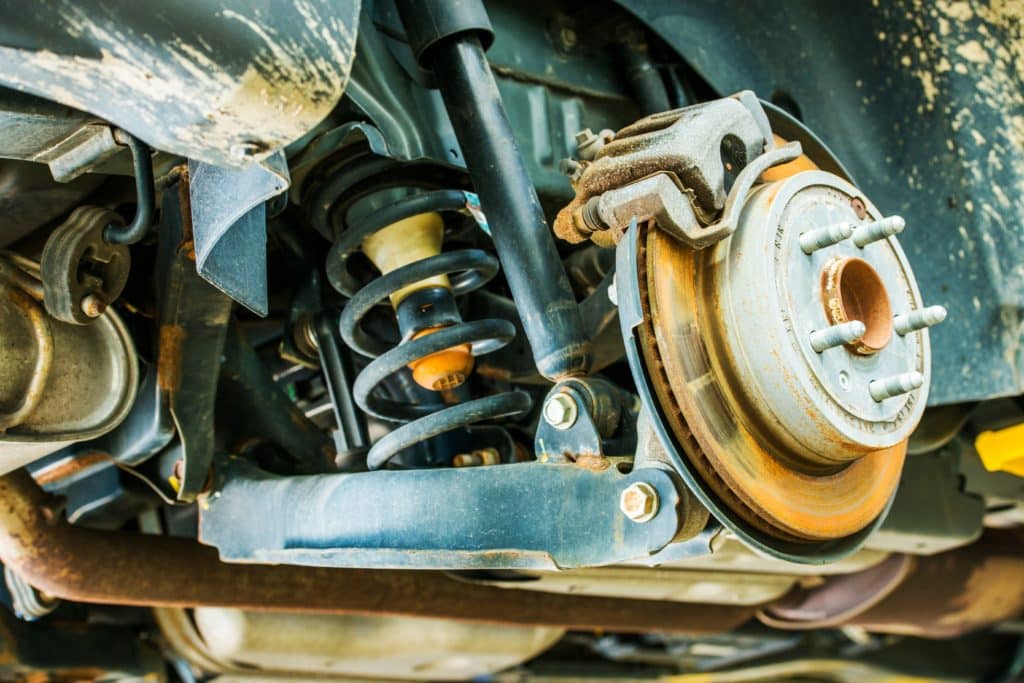Is your vehicle producing a screeching noise when you are coming to a stop? If you are hearing a squealing sound when putting pressure on the brake pedal, this may be a key indicator that your vehicle is in need of new brakes.
What Type of Brakes Are There?
In the automotive world, there are four types of brakes and a few different braking systems.

4 Types of Car Brakes:
- Disc Brakes
- Drum Brakes
- Emergency Brakes
- Anti-Lock Brakes
Disc Brakes
Disc brakes consist of a brake rotor. A brake rotor is connected straight to the wheel. Disc brakes use a hydraulic braking system. The friction between the disc brake pads and the rotor will cause the car to slow down, allowing you to stop. Disc brakes are one of the most common types of brakes used.
Drum Brakes
Drum brakes include a brake drum connected to the inside of the wheel. When the brake pedal is engaged, hydraulic pressure forces two brake shoes against the brake drum. This motion results in friction, causing the vehicle to slow down to a halt.
Emergency Brakes
Emergency brakes are commonly referred to as parking brakes. An emergency brake is designed to be a secondary braking system that works independently from the primary brakes.
There are several different kinds of emergency brakes. Usually, emergency brakes are created as a stick lever placed to the right of the driver. They are seen as a third pedal or a handle near the steering column. Emergency brakes are mainly used to keep a vehicle immobile while parked or in emergency situations if stationary brakes fail.
Anti-Lock Brakes
Anti-lock braking systems are found on a majority of newer vehicles. They are referred to as ABS. If the stationary brakes are applied instantly, the Anti-lock braking system will prevent the wheels from locking up. This is going to keep the tires from skidding. This braking feature comes in handy when driving on slippery or snowy road conditions.
Braking Systems:
- Hydraulic braking system
- Electromagnetic braking system
- Servo braking system
- Mechanical braking system
How long are brakes supposed to last?
Depending on the mileage and way you drive your vehicle can determine how long your brakes are able to last. The average lifespan of brakes usually ranges from 25,000 to 65,000 miles. With that being said, some drivers are able to keep their brakes beyond 80,000 miles. If you are easy on the brake pedal and drive with care, you can lengthen the lifespan of your brakes and minimize the wear and tear.
How do you know when you need new brakes?
Are unsure when you need to replace your brakes? There are a few signs to look for when determining the lifespan of your brakes if you aren’t following the replacement schedule of your vehicle’s mileage.
Signs You Need New Brake Pads
- Squealing Noise: The most obvious sign is the squealing noise heard when you are braking to a stop.
- Clicking Noise: If you hear a clicking noise coming from your vehicle, it could mean you need new brakes. Depending on the vehicle, brake pads fit closely into a special holding device. If the mechanisms that are meant to hold the brake pads snuggly in place loosen, the brake pads can wobble and rattle. The rattling, clicking sound can be heard when the brake pedal is engaged or disengaged.
- Brake Fade: Brake fade is the wear and tear of brake pads from excessive engagement for a long-distance resulting in a lengthened time to bring your vehicle to a complete stop. Sometimes, your vehicle may not come to a complete stop. When you brake for a long period of time, say down a hill or mountain, the brakes will heat up. The heated brakes are less likely to create the necessary friction to stop. This is most common in mountainous and hill areas.
- The brake pedal shakes when pressed.
Should you replace all 4 brake pads at once?
Generally, yes you definitely should be getting all 4 brake pads replaced at the same time. Each one of your brakes should be replaced at the same time because the wear on each brake should be about the same. If they are not, there may be a larger issue at hand that must be addressed urgently.
How can I make my brakes last longer?
There are a few precautions to take if you want to lengthen the life of your brakes.
- Avoid unnecessary, heavy braking
- Create plenty of following distance between your vehicle and the vehicle in front of you
- Remove unnecessary weight from your vehicle
- Keep acceleration light in heavy, stop and go traffic
- Enter turns slower
Contact Layton Carcare Today
Ensuring your brakes are properly functioning can create a safe drive. Brake replacement can be overwhelming and stressful, but it doesn’t have to be. Layton Carcare provides quality brake replacements to Northern Utah. Call Layton Carcare today for the best brake repair services in Utah at (801) 593-9200 .
[author_info]